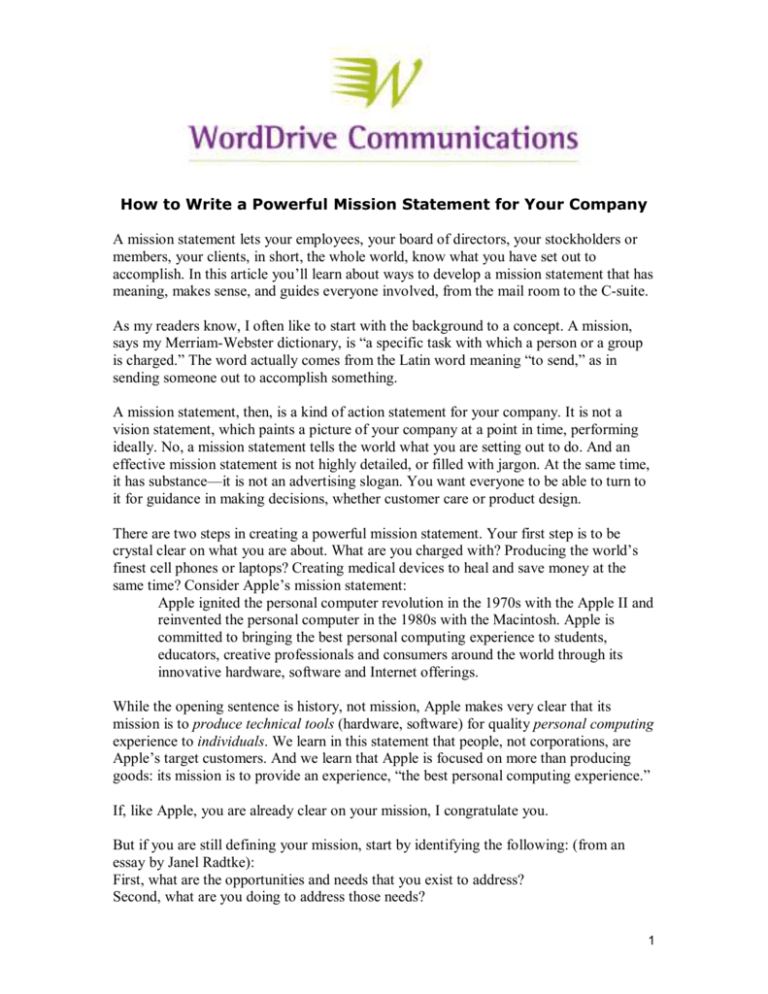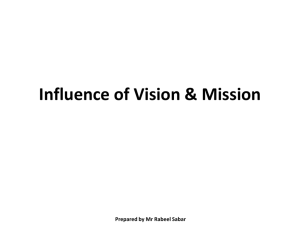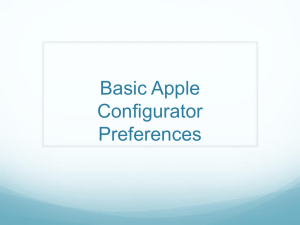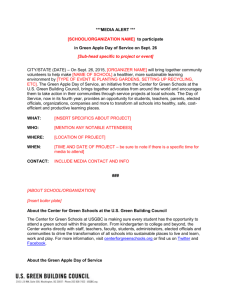How to Write a Powerful Mission Statement For Your Company
advertisement

How to Write a Powerful Mission Statement for Your Company A mission statement lets your employees, your board of directors, your stockholders or members, your clients, in short, the whole world, know what you have set out to accomplish. In this article you’ll learn about ways to develop a mission statement that has meaning, makes sense, and guides everyone involved, from the mail room to the C-suite. As my readers know, I often like to start with the background to a concept. A mission, says my Merriam-Webster dictionary, is “a specific task with which a person or a group is charged.” The word actually comes from the Latin word meaning “to send,” as in sending someone out to accomplish something. A mission statement, then, is a kind of action statement for your company. It is not a vision statement, which paints a picture of your company at a point in time, performing ideally. No, a mission statement tells the world what you are setting out to do. And an effective mission statement is not highly detailed, or filled with jargon. At the same time, it has substance—it is not an advertising slogan. You want everyone to be able to turn to it for guidance in making decisions, whether customer care or product design. There are two steps in creating a powerful mission statement. Your first step is to be crystal clear on what you are about. What are you charged with? Producing the world’s finest cell phones or laptops? Creating medical devices to heal and save money at the same time? Consider Apple’s mission statement: Apple ignited the personal computer revolution in the 1970s with the Apple II and reinvented the personal computer in the 1980s with the Macintosh. Apple is committed to bringing the best personal computing experience to students, educators, creative professionals and consumers around the world through its innovative hardware, software and Internet offerings. While the opening sentence is history, not mission, Apple makes very clear that its mission is to produce technical tools (hardware, software) for quality personal computing experience to individuals. We learn in this statement that people, not corporations, are Apple’s target customers. And we learn that Apple is focused on more than producing goods: its mission is to provide an experience, “the best personal computing experience.” If, like Apple, you are already clear on your mission, I congratulate you. But if you are still defining your mission, start by identifying the following: (from an essay by Janel Radtke): First, what are the opportunities and needs that you exist to address? Second, what are you doing to address those needs? 1 Writing a Powerful Mission Statement Third, what principles or beliefs guide your work? You may wish to develop the answers to these questions by inviting employees at all levels to contribute, through a survey, or meetings at departmental or corporate levels, depending on your size. You may decide to hire a public relations firm to do this work for you. No matter what your method, however, it’s essential that you answer these questions. Once your team has gathered answers, it’s time for the second step: to pull the material together into a well-written, persuasive, effective statement that speaks to everyone who is part of your company. Let’s see how Miami Children’s Hospital in Florida has answered these questions in their mission statement: To provide excellent family centered health care to children in an academic environment that meets or exceeds the expectations of those we serve and educate. To collaborate with others in our community to improve the health status of children. The opportunities and needs they address are two: children’s health care in an academic environment, and children’s health in the community. This much is clear. However, they have inserted the task of “serving and educating,” somewhat confusing their point. They address these opportunities and needs presumably through their hospital, and by working with others in their community. Their principles and beliefs include care that is excellent and family-centered, and the importance of working outside the hospital, in the community. I would firm up this statement in several ways by dividing it into three parts, retaining the reference to high standards, to children’s health, and to education: To provide outstanding family centered health care to children in our academic hospital facilities, to exceed the expectations of those we serve and educate, and to collaborate with others in our community to improve the health status of children. Instead of an opening sentence filled with too many ideas, we now have a single sentence, easier to memorize, and easier to understand. To an extent, mission statements are poetry, designed to evoke a sense of your brand and your corporate culture. So keep them short, don’t try to cram everything in, and use language with some pleasing flow to it. --Jane Sherwin WordDrive Communications Copyright (c) 2011 Jane Sherwin. You may reprint this entire article and you must include the copyright info and the following statement: "Jane Sherwin is a writer who helps hospitals and other healthcare facilities communicate their strengths and connect with their readers.” Subscribe to Jane’s free monthly e-newsletter at http://worddrivecommunications.com/ for short, powerful articles delivered directly to your inbox. Get practical tips on communicating effectively with customers, clients, employees and the public. 2




